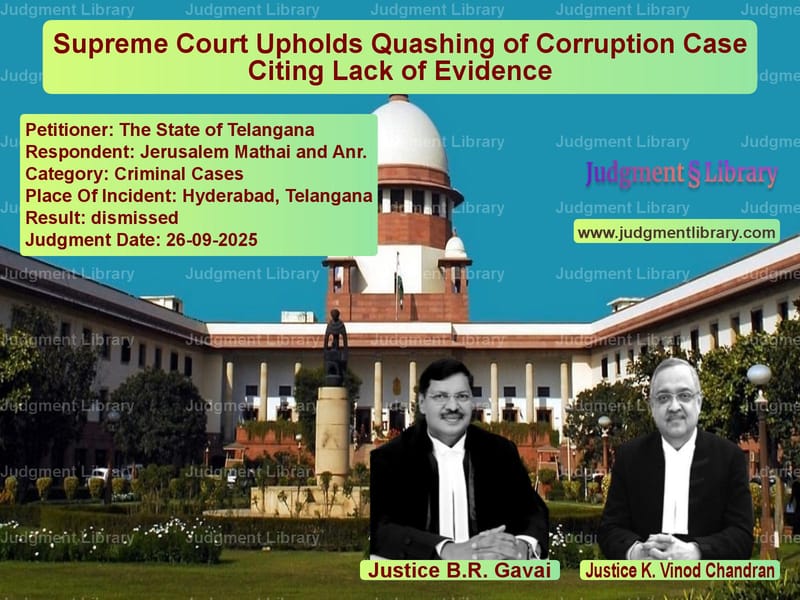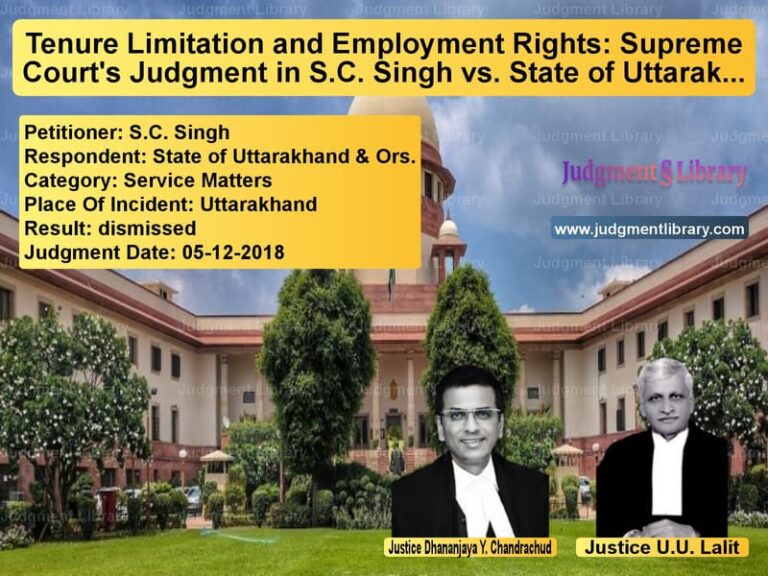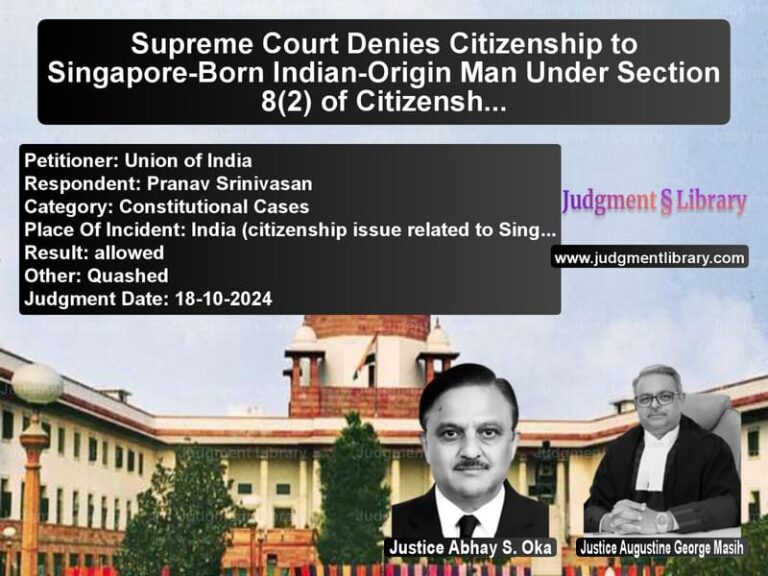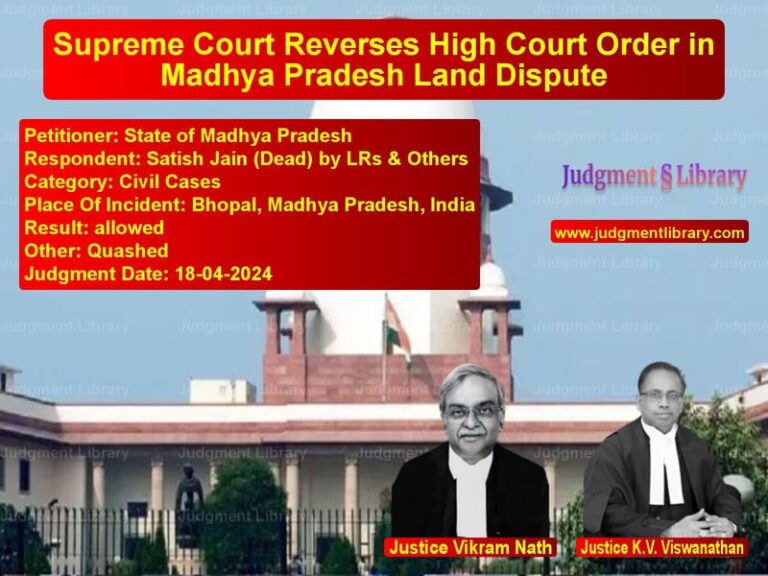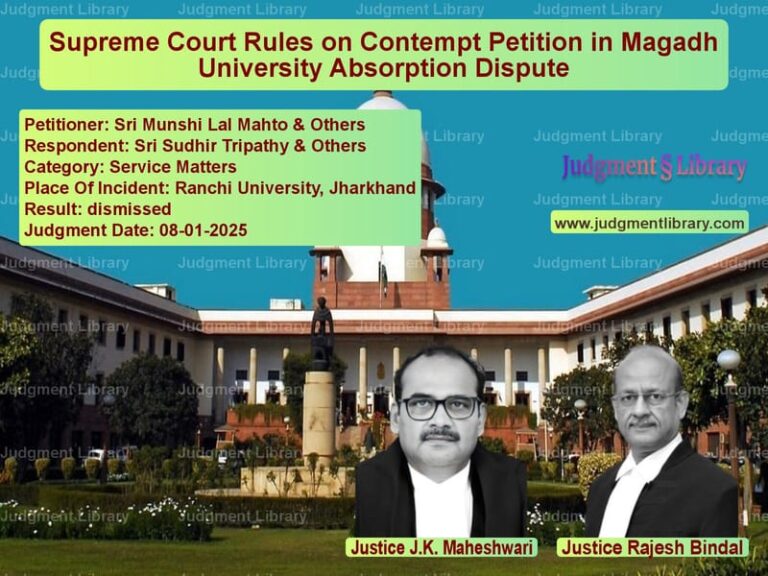Supreme Court Upholds Quashing of Corruption Case Citing Lack of Evidence
In a significant ruling that underscores the importance of concrete evidence in criminal proceedings, the Supreme Court recently dismissed the State of Telangana’s appeal against the quashing of a corruption case involving political bribery allegations. The case centered around Jerusalem Mathai, who had been accused of offering bribes to influence voting in Legislative Council elections, but the Court found the evidence against him insufficient to proceed with prosecution.
The legal battle began when the Anti-Corruption Bureau Police Station in Hyderabad registered a crime against Mathai, designated as A4 in the case, under Section 12 of the Prevention of Corruption Act, 1988. The allegations stemmed from a complaint filed by a Member of Legislative Assembly on May 28, 2015, addressed to the Director General of the Anti-Corruption Bureau. The complainant alleged that Mathai had offered him Rs. 2 crores and a ticket to leave the country to either abstain from voting or vote in favor of a particular political party in the MLC elections scheduled for June 1, 2015.
The State of Telangana, represented by Dr. Menaka Guruswamy, learned Senior Counsel, vigorously contested the High Court’s decision to quash the proceedings. The State’s primary argument was that “the High Court has erred insofar as conducting a mini trial in the quashing proceedings which has been deprecated by this Court on many occasions.” The State emphasized that “the FIR is read out to indicate that there is a cognizable offence made out, there were also recordings made, and the bribe amounts recovered, in which event, there should not have been an order of quashing at such a preliminary stage.”
However, the respondents’ counsel presented a compelling counter-argument, asserting that “there was absolutely no material against A4, the petitioner before the High Court, and the quashing was on valid grounds as no cognizable offence being made out and the allegations made in the FIR and the complaint, at least against A4, are so improbable as to justify the quashing of the proceedings.”
The Supreme Court bench comprising Chief Justice B.R. Gavai and Justice K. Vinod Chandran carefully examined the factual matrix of the case and found several critical flaws in the prosecution’s case. The Court noted that while the High Court’s order was quite lengthy, this alone wasn’t sufficient grounds for setting it aside. In a noteworthy observation about judicial writing, the Court stated: “Brevity at times is a virtue but often in legalese it is faulted as levity and in adjudicatory orders, projected as non-application of mind.”
Delving into the specifics of the case, the Court uncovered several procedural and substantive irregularities. The written complaint dated May 28, 2015, wasn’t immediately acted upon, and no FIR was registered on that date. The FIR only came into existence on May 31, 2015, despite the information being received on May 28, 2015, at 15:00 hours. The general diary reference showed an entry made on May 31, 2015, at 23:00 hours, raising questions about the timing and handling of the complaint.
The Court made a crucial observation about the nature of the allegations: “As per the complaint, first, it was alleged that the petitioner before the High Court had offered him Rs.2 crores and a ticket to leave the country or vote in the elections to the Member of Legislative Council (MLC) scheduled on 01.06.2015 in favour of a particular political party. The second paragraph indicates that a higher offer of Rs.5 crores was made for the identical conduct of abstaining from the voting or to vote in a particular manner.”
However, the Court identified fatal weaknesses in the prosecution’s case. There was “no indication in the complaint as to when such offer was made and nothing stated as to the response made by the complainant. It was also not alleged that the two instances were in any way connected.” This lack of specific details and temporal context significantly weakened the allegations.
The most damaging finding for the prosecution was that “admittedly, the petitioner before the High Court, A4 was not present on the occasion when the transaction is alleged to have occurred.” The Court further noted that “the allegation made in the complaint against A4 is not in any way linked with the allegation of a higher offer having been made by another. The presence of A-4 is not reported when the alleged transaction occurred.”
In its concluding remarks, the Supreme Court delivered a clear verdict: “We would not speak on the incident that occurred on 31.05.2015 since the persons allegedly involved in the said transactions are not before us. However, we cannot but notice that there is nothing to connect A4 to the crime, but for a casual allegation raised on a call having been received by the complainant without any indication even of the time when such call was received. We find absolutely no reason to interfere with the order of the High Court and dismiss the Special Leave Petitions.”
This judgment reinforces several important legal principles in criminal jurisprudence. First, it emphasizes that mere allegations, without concrete evidence linking the accused to the crime, cannot form the basis for criminal prosecution. Second, it affirms the power of courts to quash proceedings at the preliminary stage when the allegations are improbable or lack evidentiary support. Third, it underscores that the registration of an FIR and the existence of technical compliance with procedural requirements cannot substitute for substantive evidence connecting the accused to the offense.
Read also: https://judgmentlibrary.com/supreme-court-quashes-rape-case-citing-vengeful-motive-and-legal-malice/
The Court’s decision also highlights the delicate balance courts must maintain between allowing legitimate prosecutions to proceed and protecting individuals from frivolous or unsubstantiated criminal cases. While corruption cases involving public officials and election processes are serious matters that require thorough investigation, the Court made it clear that even in such sensitive cases, the fundamental principles of criminal law and evidence cannot be compromised.
This ruling serves as an important reminder to investigating agencies about the need for proper evidence collection and thorough investigation before initiating criminal proceedings. It also reinforces the protection available to citizens against criminal prosecution based on vague, unsubstantiated, or improbable allegations. The judgment maintains the integrity of the criminal justice system by ensuring that only cases with genuine evidentiary foundation proceed to trial, thereby preventing the misuse of legal processes and protecting individuals from unnecessary harassment through prolonged litigation.
In the broader context of anti-corruption enforcement, the judgment doesn’t weaken the fight against corruption but rather strengthens it by insisting on proper investigative standards and evidence-based prosecution. This approach ensures that genuine cases are built on solid foundations, ultimately leading to more successful convictions while filtering out weak cases that would otherwise clog the judicial system and undermine public confidence in anti-corruption efforts.
Petitioner Name: The State of Telangana.Respondent Name: Jerusalem Mathai and Anr..Judgment By: Justice B.R. Gavai, Justice K. Vinod Chandran.Place Of Incident: Hyderabad, Telangana.Judgment Date: 26-09-2025.Result: dismissed.
Don’t miss out on the full details! Download the complete judgment in PDF format below and gain valuable insights instantly!
Download Judgment: the-state-of-telanga-vs-jerusalem-mathai-and-supreme-court-of-india-judgment-dated-26-09-2025.pdf
Directly Download Judgment: Directly download this Judgment
See all petitions in Fraud and Forgery
See all petitions in Bail and Anticipatory Bail
See all petitions in Money Laundering Cases
See all petitions in Extortion and Blackmail
See all petitions in Other Cases
See all petitions in Judgment by B R Gavai
See all petitions in Judgment by K. Vinod Chandran
See all petitions in dismissed
See all petitions in supreme court of India judgments September 2025
See all petitions in 2025 judgments
See all posts in Criminal Cases Category
See all allowed petitions in Criminal Cases Category
See all Dismissed petitions in Criminal Cases Category
See all partially allowed petitions in Criminal Cases Category

